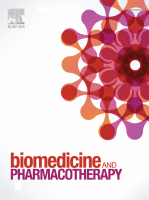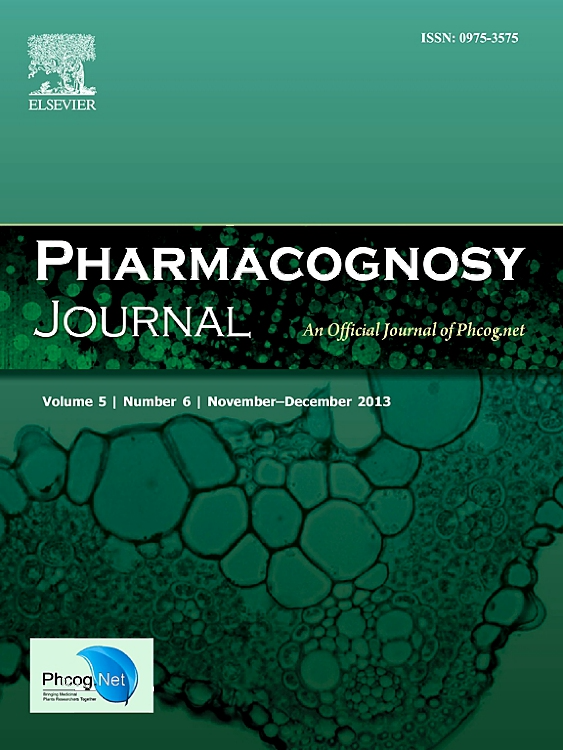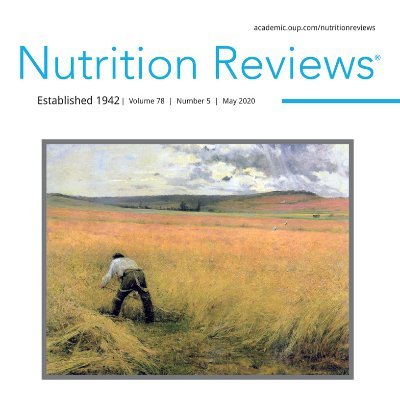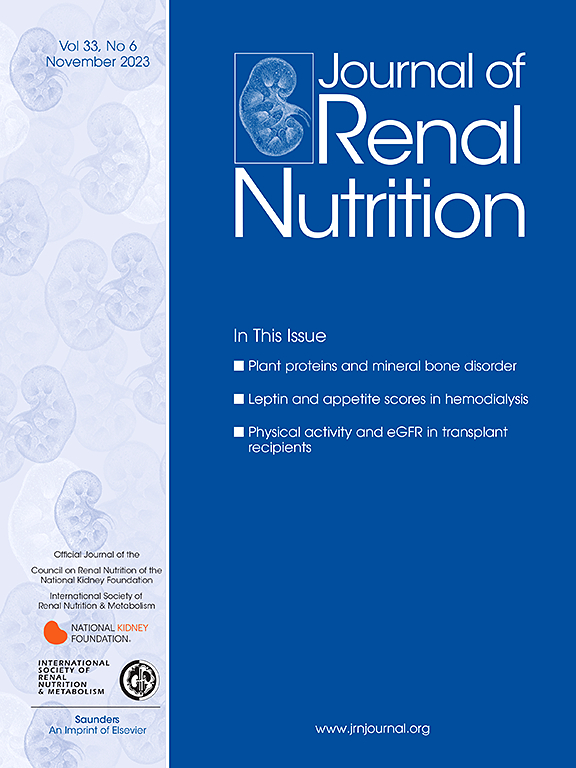Kidney Disease
How to submit an article:
- Registered users can submit any published journal article that has a unique DOI (Digital Object Identifier) name or link to Research Hub.
- For example, you can paste the full DOI link:
https://doi.org/10.1109/5.771073or just the DOI name:10.1109/5.771073into the field above and click submit. - The person who is first to submit a valid article to Research Hub will forever be credited for it, and every article submission earns you +6 Research Points.
Related Topics
Published research studies are articles that present the findings of original research that has undergone a peer-review process and has been made publicly available in scholarly journals, books or other media.

Shen Qi Wan ameliorates nephritis in chronic kidney disease via AQP1 and DEFB1 regulation
2024 Jan Biomedicine & Pharmacotherapy Liu Y, Hong X, Liu L, Li X, Huang S, Luo Q, et al.
SQW demonstrated a reduction in renal collagen deposition, decreased serum inflammatory cytokine levels, and improved renal function in adenine-induced CKD mice and AQP1-/- mice. The potential therapeutic target β-defensin 1 (DEFB1) was identified, and SQW was found to alleviate inflammatory responses by fostering AQP1-mediated DEFB1 expression. The renal-protective effect of SQW was partly attenuated after AQP1 gene knockout, highlighting its potential as a novel strategy for CKD management.
Experimental Study Shen Qi Wan
Safety Assessment of Supplementation with Cymbopogon citratus Stapf. (Lemongrass) Extract in Patients with Chronic Kidney Disease Stage 3: A Preliminary 90-Days Prospective Study
2024 Jan 01 Pharmacognosy Journal Wongmanit P, Tungsukruthai P, Phetkate P, Rungprai D, Tungsukruthai S, Supasyndh O, et al.
The study concluded that C. citratus supplementation is safe for CKD stage 3 patients and may help delay the progression of the disease without causing notable side effects.
Experimental Study Clinical Study Lemongrass Chronic Kidney Disease
Jian-Pi-Yi-Shen formula alleviates renal fibrosis by restoring NAD+ biosynthesis in vivo and in vitro
2023 Dec 28 Aging Gao L, Huang X, Deng R, Wu S, Peng Y, Xiong G, et al.
Experimental Study Animal Study Renal Fibrosis Jian Pi Yi Shen Formula Chronic Kidney DiseaseJian-Pi-Yi-Shen formula has shown potential in delaying kidney deterioration in chronic kidney disease by rejuvenating the process of creating nicotinamide adenine dinucleotide.

Jian-Pi-Yi-Shen formula restores iron metabolism from dysregulation in anemic rats with adenine-induced nephropathy
2023 Aug Journal of Ethnopharmacology Li C, Huang H, Wang R, Zhang C, Huang S, Wu J, et al.
Experimental Study Animal Study Jian Pi Yi Shen Formula Chronic Kidney Disease AnaemiaThe herbal decoction Jian-Pi-Yi-Shen reduces symptoms of chronic kidney disease and anaemia by improving iron metabolism and inhibiting the JAK2-STAT3 signaling pathway.

Blueberry, cranberry, raspberry, and strawberry as modulators of the gut microbiota: target for treatment of gut dysbiosis in chronic kidney disease? From current evidence to future possibilities
2023 May 10 Nutrition Reviews Coutinho-Wolino KS, Melo MFS, Mota JC, Mafra D, Guimarães JT, Stockler-Pinto MB
Review Article Gut Microbiota Chronic Kidney Disease Strawberry Raspberry Blueberry CranberryBerry fruits such as blueberries, cranberries, raspberries, and strawberries could potentially improve gut microbiota and reverse dysbiosis in chronic kidney disease patients.
Research insights are moderated by the Research Hub team and offer an at-a-glance overview of interesting research findings.

2023 Aging
Jian-Pi-Yi-Shen formula has shown potential in delaying kidney deterioration in chronic kidney disease by rejuvenating the process of creating nicotinamide adenine dinucleotide.
Experimental Study Chronic Kidney Disease Jian Pi Yi Shen Formula Renal Fibrosis
Jian-Pi-Yi-Shen formula alleviates renal fibrosis by restoring NAD+ biosynthesis in vivo and in vitro
Gao L, Huang X, Deng R, Wu S, Peng Y, Xiong G, et al.

2023 Journal of Ethnopharmacology
The herbal decoction Jian-Pi-Yi-Shen reduces symptoms of chronic kidney disease and anaemia by improving iron metabolism and inhibiting the JAK2-STAT3 signaling pathway.
Experimental Study Anaemia Chronic Kidney Disease Jian Pi Yi Shen Formula
Jian-Pi-Yi-Shen formula restores iron metabolism from dysregulation in anemic rats with adenine-induced nephropathy
Li C, Huang H, Wang R, Zhang C, Huang S, Wu J, et al.

2023 Nutrition Reviews
Berry fruits such as blueberries, cranberries, raspberries, and strawberries could potentially improve gut microbiota and reverse dysbiosis in chronic kidney disease patients.
Review Article Blueberry Chronic Kidney Disease Cranberry Gut Microbiota Raspberry
Blueberry, cranberry, raspberry, and strawberry as modulators of the gut microbiota: target for treatment of gut dysbiosis in chronic kidney disease? From current evidence to future possibilities
Coutinho-Wolino KS, Melo MFS, Mota JC, Mafra D, Guimarães JT, Stockler-Pinto MB

2022 Frontiers in Pharmacology
Various traditional Chinese medicine treatment strategies could potentially provide an effective alternative in slowing the progression of Chronic Kidney Disease.
Review Article Chronic Kidney Disease Dan Shen Dang Gui Fu Ling Huang Qi
Traditional Chinese Medicine in the Treatment of Chronic Kidney Diseases: Theories, Applications, and Mechanisms
Yunlai Wang, Ye Feng, Manman Li, Mo Yang, Gaoxiang Shi, Zihua Xuan, et al.

2022 Frontiers in Pharmacology
The Jian Pi Yi Shen formula in traditional Chinese medicine demonstrates a protective effect on kidneys by modulating tryptophan metabolism and Aryl hydrocarbon receptor activation.
Network Pharmacology Chronic Kidney Disease Jian Pi Yi Shen Formula Tryptophan
Jian-Pi-Yi-Shen Formula Improves Adenine-Induced Chronic Kidney Disease via Regulating Tryptophan Metabolism and Aryl Hydrocarbon Receptor Signaling
Liu X, Deng R, Chen Y, Huang S, Lu J, Zheng L, et al.
Review Articles
Review articles summarise and critically evaluate the current state of research on a specific topic or field by synthesising multiple primary research studies.

Blueberry, cranberry, raspberry, and strawberry as modulators of the gut microbiota: target for treatment of gut dysbiosis in chronic kidney disease? From current evidence to future possibilities
2023 May 10 Nutrition Reviews Coutinho-Wolino KS, Melo MFS, Mota JC, Mafra D, Guimarães JT, Stockler-Pinto MB
Review Article Gut Microbiota Chronic Kidney Disease Strawberry Raspberry Blueberry CranberryBerry fruits such as blueberries, cranberries, raspberries, and strawberries could potentially improve gut microbiota and reverse dysbiosis in chronic kidney disease patients.

Plant flavonoids bioavailability in vivo and mechanisms of benefits on chronic kidney disease: a comprehensive review
2022 Sep 22 Phytochemistry Reviews Lin Y, Fang J, Zhang Z, Farag MA, Li Z, Shao P
Plant flavonoids exhibit an alleviating effect on CKD through various mechanisms, including the reduction of oxidative stress, immune modulation, anti-inflammation, inhibition of renal fibrosis, anti-apoptosis, and regulation of gut flora. The study explores how plant flavonoids contribute to the improvement of renal health in CKD patients by regulating the intestinal flora through the gut-kidney axis. Additionally, the review introduces the products and development prospects of plant flavonoids in the context of CKD.
Review Article Chronic Kidney Disease Cucumber
Traditional Chinese Medicine in the Treatment of Chronic Kidney Diseases: Theories, Applications, and Mechanisms
2022 Jul 18 Frontiers in Pharmacology Yunlai Wang, Ye Feng, Manman Li, Mo Yang, Gaoxiang Shi, Zihua Xuan, et al.
Review Article Chronic Kidney Disease Yi Qi Qing Re Gao Huang Qi San Qi Dang Gui Qu Feng Tong Luo Recipe Dan Shen Zhen Wu Decoction Fu LingVarious traditional Chinese medicine treatment strategies could potentially provide an effective alternative in slowing the progression of Chronic Kidney Disease.

Traditional Chinese Medicine in the Treatment of Chronic Kidney Diseases: Theories, Applications, and Mechanisms
2022 Jul 18 Frontiers in Pharmacology Wang Y, Feng Y, Li M, Yang M, Shi G, Xuan Z, et al.
The review concludes that TCM strategies for treating CKD, based on invigorating Qi, tonifying the kidneys, promoting blood circulation, removing stasis, eliminating heat and dampness, removing turbidity, and eliminating edema, are multitargeted and multifunctional. Several CMMs have shown efficacy in delaying CKD progression, as supported by clinical evidence or experimental studies.
Experimental Study Review Article Chronic Kidney Disease
Tetramethylpyrazine: An Active Ingredient of Chinese Herbal Medicine With Therapeutic Potential in Acute Kidney Injury and Renal Fibrosis
2022 Jan 25 Frontiers in Pharmacology Li J, Gong X
The study concludes that TMP may effectively prevent AKI by reducing oxidative stress injury, inhibiting inflammation, preventing apoptosis of intrinsic renal cells, and regulating autophagy. Additionally, TMP shows potential in impeding the progression of CKD through its anti-renal fibrosis effects.
Review Article Tetramethylpyrazine Acute Kidney Injury Renal Fibrosis Chuan XiongClinical Trials
Clinical trials are research studies that involve people and are conducted to evaluate the safety and efficacy of new treatments or interventions, such as drugs, medical devices, or behavioural therapies.

Bupi Yishen Formula Versus Losartan for Non-Diabetic Stage 4 Chronic Kidney Disease: A Randomized Controlled Trial
2021 Jan 29 Frontiers in Pharmacology Mao W, Yang N, Zhang L, Li C, Wu Y, Ouyang W, et al.
No significant between-group differences were observed in the incidence of adverse events. We conclude that BYF might have renoprotective effects among non-diabetic patients with CKD4 in the first 12 weeks and over 48 weeks, but longer follow-up is required to evaluate the long-term effects.
Randomised Controlled Trial Bupi Yishen Formula
Efficacy and Safety of Chinese Herbal Formula Granules in Treating Chronic Kidney Disease Stage 3: A Multicenter, Randomized, Placebo-Controlled, Double-Blind Clinical Trial
2020 Oct 21 Evidence-Based Complementary and Alternative Medicine Zhao J, Sun W, Chen J, Sun Z, Chen D, Cao C, et al.
Randomised Controlled TrialThe use of Chinese herbal formula granules appears to improve kidney function in stage 3 chronic kidney disease patients.

A Pilot Randomized Crossover Trial Assessing the Safety and Short-Term Effects of Walnut Consumption by Patients with Chronic Kidney Disease
2019 Dec 25 Nutrients Sanchis P, Molina M, Berga F, Muñoz E, Fortuny R, Costa-Bauzá A, et al.
Randomised Controlled Trial Walnut High Blood Pressure Chronic Kidney Disease Cardiovascular DiseaseConsuming walnuts daily can reduce cardiovascular risk factors in chronic kidney disease patients without altering significant physiological levels.
Study Protocols
Published study protocols are detailed plans that outline the objectives, methodology, statistical analyses, and organisation of a research study that have been made publicly available for others to review and use as a reference.
Presentation Slides

Experimental Study
Jian-Pi-Yi-Shen formula has shown potential in delaying kidney deterioration in chronic kidney disease by rejuvenating the process of creating nicotinamide adenine dinucleotide.
Gao L, Huang X, Deng R, Wu S, Peng Y, Xiong G, Lu J, Liu X

Experimental Study
The herbal decoction Jian-Pi-Yi-Shen reduces symptoms of chronic kidney disease and anaemia by improving iron metabolism and inhibiting the JAK2-STAT3 signaling pathway.
Li C, Huang H, Wang R, Zhang C, Huang S, Wu J, Mo P, Yu H, Li S, Chen J

Review Article
Berry fruits such as blueberries, cranberries, raspberries, and strawberries could potentially improve gut microbiota and reverse dysbiosis in chronic kidney disease patients.
Coutinho-Wolino KS, Melo MFS, Mota JC, Mafra D, Guimarães JT, Stockler-Pinto MB

Review Article
Various traditional Chinese medicine treatment strategies could potentially provide an effective alternative in slowing the progression of Chronic Kidney Disease.
Yunlai Wang, Ye Feng, Manman Li, Mo Yang, Gaoxiang Shi, Zihua Xuan, Dengke Yin, Fan Xu

Network Pharmacology
The Jian Pi Yi Shen formula in traditional Chinese medicine demonstrates a protective effect on kidneys by modulating tryptophan metabolism and Aryl hydrocarbon receptor activation.
Liu X, Deng R, Chen Y, Huang S, Lu J, Zheng L, Xiong G, Li S

Network Pharmacology
Luteolin, a component of traditional Chinese medicine herb Zi Su Ye, has been found to alleviate kidney disease stage 3-5 by reducing renal tubular epithelial cell apoptosis.
Yong C, Zhang Z, Huang G, Yang Y, Zhu Y, Qian L, Tian F, Liu L, Wu Q, Xu Z, Chen C, Zhao J, Gao K, Zhou E

Review Article
Chinese herbal medicines could alleviate chronic kidney disease symptoms by combating fibrosis, inflammation, oxidative stress, and encouraging repair and regeneration.
Shao M, Ye C, Bayliss G, Zhuang S

Review Article
Chinese herbal medicines may improve treatment for those with chronic kidney disease, due to their anti-inflammatory, antioxidative, anti-apoptotic, autophagy-mediated, and antifibrotic effects.
Zhao M, Yu Y, Wang R, Chang M, Ma S, Qu H, Zhang Y

Experimental Study
The Jian-Pi-Yi-Shen (JPYS) traditional Chinese medicine formula aids in the alleviation of renal dysfunction and fibrosis in chronic kidney disease (CKD) rats by combating inflammation and cellular apoptosis.
Zhou F, Zou X, Zhang J, Wang Z, Yang Y, Wang D

Experimental Study
Extra virgin olive oil high in minor polar compounds significantly improves kidney function, reduces oxidative stress, inflammation, and ultimately benefits the body composition.
Noce A, Marrone G, Urciuoli S, Di Daniele F, Di Lauro M, Pietroboni Zaitseva A, Di Daniele N, Romani A

Systematic Review
Acupuncture has a positive effect in improving quality of life, fatigue and sleep in patients with chronic kidney disease.
Melo GAA, Aguiar LL, Silva RA, Pereira FGF, Silva FLBD, Caetano JÁ.

Systematic Review
Consuming coffee is associated with lower risks of developing chronic kidney disease, reaching end-stage kidney disease, and having albuminuria.
Kanbay M, Siriopol D, Copur S, Tapoi L, Benchea L, Kuwabara M, Rossignol P, Ortiz A, Covic A, Afsar B

Animal Study
Jian-Pi-Yi-Shen, a traditional Chinese medicine, helps treat anemia in chronic kidney disease by stimulating erythropoietin production and regulating iron recycling.
Wang F, Yu H, Huang S, Zheng L, Zheng P, Zhang S, Li S, Chen J

Randomised Controlled Trial
The use of Chinese herbal formula granules appears to improve kidney function in stage 3 chronic kidney disease patients.
Zhao J, Sun W, Chen J, Sun Z, Chen D, Cao C, Yang M, Ma J, Wang L, Xing C, Chen Y, Sheng M, Zhou E, Xu L, Gao K, Liu L, Liu Q, Yi L, He W, Zhu Y

Randomised Controlled Trial
Consuming walnuts daily can reduce cardiovascular risk factors in chronic kidney disease patients without altering significant physiological levels.
Sanchis P, Molina M, Berga F, Muñoz E, Fortuny R, Costa-Bauzá A, Grases F, Buades JM

Systematic Review
Chinese herbal medicine may be effective and safe for treating diabetic kidney disease, although evidence quality varies.
Zhang L, Yang L, Shergis J, Zhang L, Zhang AL, Guo X, Qin X, Johnson D, Liu X, Lu C, Xue CC, Mao W

Experimental Study
The Jian-Pi-Yi-Shen Formula (JPYSF) has been found to significantly improve chronic kidney disease, potentially through the modulation of the mitochondrial quality control network.
Liu X, Chen J, Liu X, Wang D, Zheng P, Qi A, Yi T, Li S

Experimental Study
The Jian-Pi-Yi-Shen formula appears to slow down chronic kidney disease progression by inhibiting inflammation via the nuclear factor-kappa B signaling pathway.
Lu J, Liu X, Liao Y, Wang D, Chen J, Li S
Executive Summary
Write an executive summary in the form of a blog article on the topic of "Research into Chinese medicine treatment for Kidney Disease" summarising the research below and using language that can be easily understood by patients and avoiding medical jargon using a professional and caring tone of voice.
Write an executive summary in the form of a blog article on the topic of "Researched Chinese medicine treatments for Kidney Disease" summarising the research below in an objective and easy to understand way, and using language that can be easily understood by patients. Group the article into Chinese medicine treatments first, followed by nutrition and other treatments. Avoid using medical jargon and use a professional and caring tone of voice.
Write me a concise but easy to understand executive summary on the topic of "Chinese medicine treatments for Kidney Disease" based on the following research that I will give you. Your summary should be 2 paragraphs long in Australian English spelling and include references to the studies.
A Experimental Study published in 2023 in the journal Aging found that Jian-Pi-Yi-Shen formula has shown potential in delaying kidney deterioration in chronic kidney disease by rejuvenating the process of creating nicotinamide adenine dinucleotide. The study was conducted utilizing an adenine-diet feeding model for inducing chronic kidney disease in a breed of mice. For 4 weeks, these mice were given Jian-Pi-Yi-Shen formula orally. Human proximal tubular epithelial cells were stimulated with a growth factor, with or without the formula. Assessments were made of renal function via serum creatinine and blood urea nitrogen levels, with renal histopathological changes evaluated through specific staining techniques. Further, cell viability and NAD+ concentrations were monitored with assay kits. The Jian-Pi-Yi-Shen formula did not only help in the improvement of renal function and reduction of pathological injury but it also inhibited renal fibrosis in the mice with chronic kidney disease. Moreover, the same formula was found to reverse fibrotic responses induced by a growth factor in human proximal tubular epithelial cells. Importantly, the formula was observed to recover the decreased NAD+ content in the chronic kidney disease mice and the human cells, bringing about the restoration of the expression of vital enzymes in the NAD+ synthesis process.
A Experimental Study published in 2023 in the journal Journal of Ethnopharmacology found that The herbal decoction Jian-Pi-Yi-Shen reduces symptoms of chronic kidney disease and anaemia by improving iron metabolism and inhibiting the JAK2-STAT3 signaling pathway. Methodology used included an analysis of network pharmacology, chemical profiling, and in vivo experiments on the effect of Jian-Pi-Yi-Shen (JPYS) on renal anemia and chronic kidney disease (CKD). The active compounds in JPYS were detected in in vivo experiment, and their potential targets were predicted by network pharmacology. An animal model of CKD-related anemia was developed using adenine-feeding for further analysis. The estimation of renal injury was conducted using blood tests, histopathological examinations, and fibrosis degree assessment while the levels of JAK2, STAT3 and iron metabolism-related factors were measured through various techniques. Discussion of the results reveals that 164 active ingredients, including prototypes and metabolites in JPYS, were discovered and 21 core targets were identified. Many of these core targets were associated with the JAK2-STAT3 signaling pathways. Experimental results demonstrated that JPYS treatment significantly improved hematological parameters and iron metabolism in CKD rats, decreased certain indicators of renal damage, and suppressed the expression of JAK2 and STAT3.
A Review Article published in 2023 in the journal Nutrition Reviews found that Berry fruits such as blueberries, cranberries, raspberries, and strawberries could potentially improve gut microbiota and reverse dysbiosis in chronic kidney disease patients. Methodology: This research explores the therapeutic potential of berry fruits, including blueberries, cranberries, raspberries, and strawberries, in relation to modulating gut microbiota in chronic kidney disease (CKD) patients. The fruit’s rich polyphenol and nutrient content are assumed to promote the selective growth of beneficial bacteria, thus improving the clinical status of these patients. The study scrutinizes the impact on the abundance of mucus-producing bacteria and short-chain fatty acids specifically. Discussion of Results: The gathered evidence illustrates that berry fruits, particularly with a daily intake of 5 mg, can promote diversity in the gut microbiota and possibly reverse dysbiosis, a common issue in chronic kidney disease patients. These fruits are found to increase the expression of mRNA involved in gut tight junctions such as occludin, TJP1, and mucin, and they may reduce uremic toxins by controlling the gut microbiota, improving the uremic condition. As such, long-term use of berry fruits could be an effective strategy for CKD patients.
A Review Article published in 2022 in the journal Frontiers in Pharmacology found that Various traditional Chinese medicine treatment strategies could potentially provide an effective alternative in slowing the progression of Chronic Kidney Disease. The study explores the use of Traditional Chinese Medicine (TCM) and various Chinese materia medica (CMM) to manage Chronic Kidney Disease (CKD). The review delves deeper into the principles and treatment approaches of TCM in battling CKD, dictating that the disease's nature is deficient in the root and excessive in the branches, where deficiency and excess persist simultaneously throughout the condition. The main strategies employed by TCM in the treatment of CKD include invigorating Qi, tonifying kidneys, promoting blood circulation, removing stasis, eliminating heat and dampness, reducing turbidity, and controlling edema. The discussion highlights the effectiveness of several CMMs in treating CKD, which are undergirded by clinical evidence or experimental studies. Notably, it points out a correlation between the macroscopic view of TCM and the microscopic view of modern medicine. These TCM and CMM strategies are hailed for their multi-targeted and multi-functional characteristics, potentially providing an effective alternative treatment approach for CKD.
A Network Pharmacology published in 2022 in the journal Frontiers in Pharmacology found that The Jian Pi Yi Shen formula in traditional Chinese medicine demonstrates a protective effect on kidneys by modulating tryptophan metabolism and Aryl hydrocarbon receptor activation. A chronic kidney disease (CKD) rat model was induced by feeding a diet containing 0.75% adenine over a four-week period. Concurrently, the Jian-Pi-Yi-Shen formula was administered every day starting from the third week and continued for four additional weeks. Multiple factors were evaluated including renal injury, fibrotic markers expression, and serum creatinine and blood urea nitrogen levels. The levels of 10 tryptophan metabolites in the rat serum and Aryl hydrocarbon receptor signaling were detected and analyzed using ultra-high performance liquid chromatography-tandem mass spectrometry and Western blot analysis, respectively. The Jian-Pi-Yi-Shen formula demonstrated significant effects of reducing both serum creatinine and blood urea nitrogen levels and improving renal pathological injuries in the CKD rat model. It was found that the formula also regulated tryptophan metabolism and decreased the levels of tryptophan metabolites in the serum. Furthermore, the formula suppressed the overactivated Aryl hydrocarbon receptor signaling in the kidney. These observations imply that the actions of the Jian-Pi-Yi-Shen formula could effectively protect against CKD.
A Network Pharmacology published in 2021 in the journal Frontiers in Pharmacology found that Luteolin, a component of traditional Chinese medicine herb Zi Su Ye, has been found to alleviate kidney disease stage 3-5 by reducing renal tubular epithelial cell apoptosis. By using network pharmacology, the research identified the active components of a traditional Chinese medicine herb used for treating chronic kidney disease stages 3-5. Active components were analyzed using high performance liquid chromatography and enriched for substantial analysis. Thereafter, critical components were verified using molecular docking and experimentations. The key therapeutic targets were observed from a constructed PPI network, and further focused on five core nodes: AKT1, TP53, IL6, TNF, and MAPK1. In discussing the results, it was revealed that 19 active components were recognized, interlinking with 108 targets of chronic kidney disease stages 3-5. The potential regulation of various biological functions by these targets was suggested. Specifically, apoptosis, T cell receptor, and PI3K-AKT signaling pathways would be modulated. Molecular docking supported the premise that active components dock successfully with corresponding targets. Luteolin emerged as the most effective component in managing adriamycin-induced renal tubular apoptosis by affecting oxidative stress and downgrading the MAPK and p53 pathways.
A Review Article published in 2021 in the journal Frontiers in Pharmacology found that Chinese herbal medicines could alleviate chronic kidney disease symptoms by combating fibrosis, inflammation, oxidative stress, and encouraging repair and regeneration. The study's methodology consisted of both clinical and experimental approaches. It started with an examination of an array of traditional Chinese herbs. The criteria for considered herbs were their clinical efficacy, frequency of use in treating chronic renal disease, and a well-studied mechanism of action. Five herbs, namely, Tanshinone II A, Salvianolic acid A & B, Triptolide, Tripterygium glycosides and a monomer from Kudzu root, made the cut after having met the set criteria. The results showed that these Chinese herbs were found to possess pharmaceutical properties that were effective against fibrosis, inflammation, and oxidative stress. Furthermore, these also showed the potential to promote renal repair and regeneration, which are fundamental for treating chronic kidney disease. These findings suggest a broader scope of therapeutic treatments that could benefit the patients in a more natural and potentially less invasive way.
A Review Article published in 2021 in the journal Frontiers in Pharmacology found that Chinese herbal medicines may improve treatment for those with chronic kidney disease, due to their anti-inflammatory, antioxidative, anti-apoptotic, autophagy-mediated, and antifibrotic effects. The methodology of the research entailed a comprehensive review of peer-reviewed English-language journals that focus on the potential benefits of Chinese herbal medicines (CHMs) in treating kidney disease. The primary factors investigated were the anti-inflammatory, antioxidative, anti-apoptotic, autophagy-mediated, and antifibrotic properties of CHMs that are commonly used in managing kidney disease. The review also incorporated newly published clinical trials and meta-analyses within this field. The results of the review found that CHMs have multiple beneficial effects, such as anti-inflammatory, antioxidative, anti-apoptotic, autophagy-mediated, and antifibrotic properties. This, backed by well-structured randomized controlled trials and meta-analyses, highlighted that the incorporation of CHMs as an auxiliary with conventional medicines could assist patients suffering from chronic kidney disease. The results, however, noted the limitations on the development of CHMs, like unknown active ingredients, inferior quality, and limited sample sizes of some clinical trials, and questions on CHMs' safety.
A Experimental Study published in 2021 in the journal Frontiers in Pharmacology found that The Jian-Pi-Yi-Shen (JPYS) traditional Chinese medicine formula aids in the alleviation of renal dysfunction and fibrosis in chronic kidney disease (CKD) rats by combating inflammation and cellular apoptosis. Using an established model of 5/6 nephrectomized (5/6Nx) rats, an evaluation of the effects of the JPYS formula on renal function and fibrosis was conducted. To scrutinize the formula's impacts, markers of apoptosis, inflammation, oxidative stress, and the activity of Nrf2 signaling were measured. Correlative parameters including urinary protein, SCr, BUN, glomerular sclerosis index, tubulointerstitial fibrosis score, and renal histopathology were analyzed to assess the formula's preventive effect on renal dysfunction and fibrosis. The study also evaluated the gene expression associated with fibrosis and related elements such as TGF-β and various types of collagen. The evaluation of JPYS's efficacy revealed significant protection against cell apoptosis, highlighted by altered gene expression of Bcl-2, Bax, caspase 3, caspase 9, and the number of TUNEL-positive cells. Moreover, it was observed that the JPYS formula countered the activation of the NF-κB-mediated inflammatory pathway, exhibiting a decrease in gene expression of numerous inflammatory markers in the kidney. Alongside this, the formula promoted antioxidant performance, alleviating oxidative stress as indicated by antioxidant index indicators and a reduction in reactive oxygen species biomarkers. The study also identified the upswing of essential elements like HO-1 and Nrf2 level and a decline in Keap1 expression, signaling rationale towards the formula's potential relief of renal oxidative damage.
A Experimental Study published in 2021 in the journal Nutrients found that Extra virgin olive oil high in minor polar compounds significantly improves kidney function, reduces oxidative stress, inflammation, and ultimately benefits the body composition. The research study tested two distinct types of extra virgin olive oils, namely Synergy with a high content and Luxolio with a medium content of minor polar compounds, on 40 patients suffering from kidney disease. The patients were administered a 40 mL dosage per day over nine weeks. Researchers assessed the impacts on renal functionality, oxidative stress, inflammation levels, and body composition, before and after a subsequent two-month wash out period. Additionally, the concentration of minor polar compounds in the oils was determined through high-performance liquid chromatography accompanied by diode-array detection and mass spectrometry (HPLC-DAD-MS). The research showed improvements in kidney function indicators such as estimated glomerular filtration rate, albuminuria, azotemia, and uric acid. Further, the patients' lipid profile also improved, as did their inflammation parameters, erythrocyte sedimentation rate, C-reactive protein, and body composition. More notably, these beneficial effects were stronger and lasted longer in those patients who had been given the Synergy oil, indicating a sustained antioxidant and anti-inflammatory impact from EVOOs with higher concentrations of minor polar compounds.
A Systematic Review published in 2021 in the journal The Brazilian Journal of Nursing found that Acupuncture has a positive effect in improving quality of life, fatigue and sleep in patients with chronic kidney disease. Nine studies were selected; the acupuncture techniques used were auriculotherapy, electroacupuncture and acupressure aimed at improving quality of life, fatigue, sleep and clinical variables of the disease. The studies that assessed quality of life, sleep and fatigue presented significant benefits. Studies that assessed quality of life, sleep and fatigue presented significant benefits. There was no statistical significance in the improvement of serum creatinine levels and glomerular filtration rate. Methodological and assessment tools’ divergence made impossible meta-analysis.
A Systematic Review published in 2021 in the journal Journal of Renal Nutrition found that Consuming coffee is associated with lower risks of developing chronic kidney disease, reaching end-stage kidney disease, and having albuminuria. In this systematic review and meta-analysis, researchers conducted a comprehensive literature search through various databases, including PubMed/Medline, Web of Science, Embase by Elsevier, and the Cochrane Central Register of Controlled Trials by Wiley from 1960 until February 2020. Outcomes related to chronic kidney disease incidence, its progression, and mortality associated with this disease were evaluated and correlated with coffee consumption and the amount consumed. Quality assessment of the included studies was done using the Newcastle-Ottawa scale. The analysis incorporated 12 studies, with a mix of prospective and cross-sectional studies, and a total of 505,841 subjects. Seven of these studies focused on the relationship between coffee consumption and the onset of chronic kidney disease. The finding was that consuming coffee was significantly correlated with a decrease in the risk for this disease, especially for individuals who took more than 2 cups of coffee per day. Furthermore, there was also a noteworthy lower risk of reaching end-stage kidney disease for coffee drinkers, as well as a decrease in the risk of albuminuria (a kidney disease marker). Finally, the risk of death related to chronic kidney disease was discovered to be lower in coffee consumers.
A Animal Study published in 2020 in the journal Evidence-Based Complementary and Alternative Medicine found that Jian-Pi-Yi-Shen, a traditional Chinese medicine, helps treat anemia in chronic kidney disease by stimulating erythropoietin production and regulating iron recycling. To investigate the effect of Jian-Pi-Yi-Shen (JPYS), chronic kidney disease (CKD) was experimentally induced in rats using a 5/6 nephrectomy. The rats were then administered JPYS orally in both high and low doses for a period of 90 days. Observations were made regarding the serum hepcidin level to assess iron homeostasis. Additionally, the protein expressions of hypoxia inducible factor-2, erythropoietin, ferritin, ferroportin, and the phosphorylation level of extracellular signal-regulated kinase 1/2 were studied using Western blot analysis. The results showed that JPYS treatment significantly improved kidney function in the CKD rats. Alongside this, pathological kidney damage was found to be significantly restored post-JPYS treatment. The medicine was found to be effective in improving anemia in CKD through the upregulation of red blood cells, hemoglobin, and hematocrit levels. It was also discovered that JPYS stimulates the expressions of erythropoietin and hypoxia-inducible factor-2 proteins in the kidney and liver of the CKD rats, while inducing the phosphorylation of extracellular signal-regulated kinase 1/2 proteins. Furthermore, JPYS was seen to regulate the protein expressions of ferritin and ferroportin in the liver and spleen, as well as in the serum level of hepcidin, suggesting its role in systemic iron recycling.
A Randomised Controlled Trial published in 2020 in the journal Evidence-Based Complementary and Alternative Medicine found that The use of Chinese herbal formula granules appears to improve kidney function in stage 3 chronic kidney disease patients. In a prospective randomized controlled study involving 343 participants with stage 3 chronic kidney disease from 9 hospitals in Jiangsu Province, individuals were randomly assigned to either a treatment or control group. Over a 24-week period, participants in the treatment group orally consumed Chinese herbal formula granules twice daily, while the control group received placebo granules. The treatments did not cause any significant difference in the levels of 24-hour proteinuria between both groups. However, patients in the treatment group demonstrated significant improvements in their kidney function compared to the control group. This was evidenced by the significantly lower levels of serum creatinine and significantly higher eGFR levels. Furthermore, the incidence of adverse events between the two groups remained similar, suggesting the treatment posed no added risk to the participants.
A Randomised Controlled Trial published in 2019 in the journal Nutrients found that Consuming walnuts daily can reduce cardiovascular risk factors in chronic kidney disease patients without altering significant physiological levels. In this prospective, randomized, crossover, pilot clinical trial, 13 patients suffering from chronic kidney disease were selected as subjects. They were randomly divided into two groups, one of which was assigned a diet including 30 grams of walnuts each day while the other followed a control diet. After a duration of 30 days, a washout period of an additional 30 days was allowed, following which the groups were switched to the alternate diet. Key markers such as urinary and serum levels of phosphorous and potassium, multiple vascular risk factors, and urinary inositol phosphates were measured before initiating the trial and post the intervention period. The study indicated that a dietary supplement of walnuts resulted in reduced blood pressure, lower LDL cholesterol, and decreased albumin excretion. Interestingly, despite these changes, it had no impact on the physiological levels of phosphorous, potassium, parathyroid hormone, and fibroblast growth factor 23. This indicates that daily consumption of walnuts, when incorporated in a sodium, protein, phosphate, and potassium controlled diet, has the potential to be an effective strategy in reducing cardiovascular risk among chronic kidney disease patients without perturbing key physiological levels.
A Systematic Review published in 2019 in the journal BMJ Open found that Chinese herbal medicine may be effective and safe for treating diabetic kidney disease, although evidence quality varies. The systematic review and meta-analysis comprised randomized controlled trials comparing the use of oral Chinese herbal medicine (CHM) to a placebo, involving a comprehensive search strategy and selecting from over 7000 articles, resulting in 20 studies with a total of 2719 participants. Potential bias was minimized by only including studies that pitted CHM against a placebo. In addition, an a priori subgroups analysis was conducted to identify potential candidate formulae and frequently used herbs for further exploration. Despite these measures, the overall evidence ranged from moderate to very low quality due to unclear randomization procedures, substantial variations in outcome measures, and reduced external validity. The latter was affected by factors such as multi-ingredient herbal formulae, brief follow-up periods, limited numbers of clinical events, and the inclusion of older patients with less advanced disease.
A Experimental Study published in 2018 in the journal BMC Complementary Medicine and Therapies found that The Jian-Pi-Yi-Shen Formula (JPYSF) has been found to significantly improve chronic kidney disease, potentially through the modulation of the mitochondrial quality control network. In the study, 5/6 nephrectomized rats were treated daily for six weeks with the Chinese herbal concoction Jian-Pi-Yi-Shen Formula and Perindopril administered orally. Signs of chronic kidney disease were studied, such as renal function, pathological harm, and fibrosis, and were evaluated. Protein levels connected to the mitochondrial quality control network were measured using Western blot and immunofluorescence analysis techniques. The research observed that the rats presented significantly decreased kidney function and qualitative injuries in kidney structure, evidenced by increased blood urea nitrogen, serum creatinine, urinary protein excretion, and signs of glomerular hypertrophy, tubular atrophy, and interstitial fibrosis. By administering the JPYSF, both the kidney function and structure saw an improvement. Further analysis unveiled that the residual kidneys of the rats had an unbalanced mitochondrial quality control network characterized by decreased mitochondrial fusion, biogenesis, mitophagy, and increased mitochondrial fission. This imbalance was rectified through treatment with the JPYSF, thus suggesting a potential therapeutic pathway.
A Experimental Study published in 2018 in the journal Evidence-Based Complementary and Alternative Medicine found that The Jian-Pi-Yi-Shen formula appears to slow down chronic kidney disease progression by inhibiting inflammation via the nuclear factor-kappa B signaling pathway. In the method used for this study, a rat model was established using a 5/6 nephrectomy process. The rats were then segregated into two groups: one group given the Jian-Pi-Yi-Shen formula treatment, and another group that served as a control. The formula, measured at a dosage of 2.06g/kg per day, was administered to the rats via gavage over a six-week period. The results from this study revealed that the Jian-Pi-Yi-Shen formula treatment led to a substantial improvement in kidney function and a reduction in pathological injury in the rat model. A Multiplex analysis of various cytokines indicated that the formula triggered a reduction in proinflammatory cytokines and an increase in anti-inflammatory cytokine production. Additionally, the formula was found to inhibit the activation of the nuclear factor-kappa B signaling pathway that is typically associated with inflammation.
Moderation Tools
Topic
Sign In
Users not signed in are limited to viewing the 5 most recent items of content.
